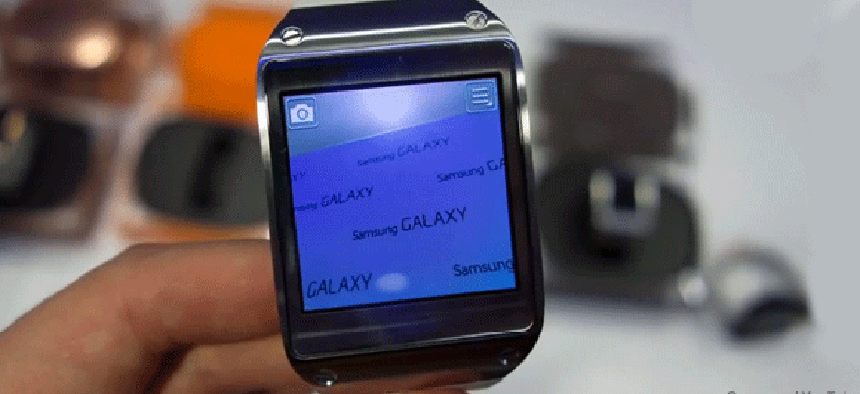Can the Galaxy Gear change the fate of wearable tech?


Connecting state and local government leaders
Samsung's new smartwatch has a few things going for it, but the track record on wearable computers, in government or out, isn't promising.
"KITT, I need you!" Michael Knight would scream into his watch, and sure enough, his computerized 1982 Pontiac Trans Am would come screeching in for a quick rescue. When I was growing up, the “Knight Rider” TV show was the pinnacle of cool, at least among my geeky friends. The car was amazing, of course, but I really loved the fact that Michael could use his watch to call it. And according to the official Knight Rider Compendium, his watch was the height of modern technology, blending cell phone communications with accurate time measurement.
Fast forward 30 years, and Samsung unveils the Galaxy Gear smartwatch. While not a full phone, it's designed to be able to link up with any of the Galaxy smartphone models, allowing users to make calls, browse apps and even share photos, all without taking their actual phones out of their pockets. CNN got a quick hands-on with the watch at the IFA consumer electronics show in Berlin, and it looked pretty impressive. In addition to acting as a companion to Galaxy phones, the Gear will have 70 applications when it launches Sept. 25 that it can run on its 1.6-inch screen.
At $299 each, and still requiring an actual companion phone to fully work, I'm not sure this watch will be the next big thing in mobile. Wearable computers have never been that popular, and I'm not just talking about the calculator watch that got me regularly beat up in high school. (By the way, KITT, I'm still waiting for that backup. Guess you didn't get my call.)
No, wearable PCs have tried for years to break into government, or the consumer market, or anywhere really. Back in 1999 we reviewed the Xybernaut Mobile Assistant IV, which was designed to make work easier for government employees. We thought it was the next big thing, but it went nowhere.
At a conference in 2001, representatives from the Army expressed cautious optimism that soldiers would be wearing computers into battle within two years. But that didn't go quite as planned, either. Microsoft, which is among the other companies reportedly working on a smartwatch, actually produced one nearly 10 years ago. It was deemed to be pretty good, too, but it also disappeared.
Some movement in this area was seen recently, with the military again trying to push the ball forward. This time the Air Force wanted a way for its techs to be able to wear a computer in the field. Something like the Motorola HC1 may fit that bill, but the jury is still out.
In one sense, the Gear has a lot going for it. Its limited scope means it can be lightweight, yet still run a lot of applications. And Samsung says the battery will last for a full day without needing a charge. Still, the last major device that needed to connect with a phone to achieve full functionality was the Blackberry Playbook, and while we thought it was perfect for government, not everyone agreed. It was eventually patched to be able to do everything on its own, sans phone.
I'll be sure to pick up a Galaxy Gear for review, though the disappointment when my 2010 Hyundai Elantra refuses to answer my calls may be too crushing.




